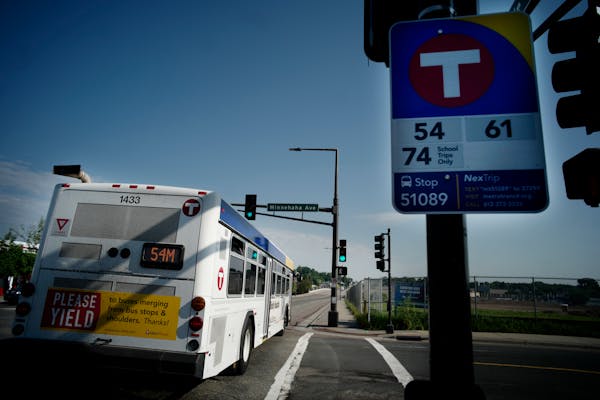The Metropolitan Council says planning for a bus rapid transit line connecting St. Paul to neighboring suburbs will move forward, despite the threatened loss of a key local government ally.
After Maplewood leaders on Monday moved to withdraw support for the Purple Line — citing the effect of potential route changes on a local business district — staff with the regional planning agency attempted to defuse tensions, saying no modifications have been finalized.
"Nothing has been finalized or decided yet," Metro Transit spokesperson Drew Kerr said in a statement Tuesday. The Met Council oversees Metro Transit.
Met Council staff will present route options to the Purple Line's Corridor Management Committee on Nov. 10, which will be followed by weeks of public review and comment, Kerr said.
Mayor Marylee Abrams — who has been an ally of the project — asked the City Council to pull its support after learning about plans to potentially buy and raze some or all of the Birch Run Station shopping complex near Maplewood Mall. The City Council agreed to vote Oct 24 to withdraw support.
Ramsey County Board members, who with the Met Council are shepherding and funding the Purple Line, expressed frustration Tuesday with Maplewood leaders' change of heart.
"I was disappointed in the fact that we are supposed to be partners. It was not the way I'd like to see things done," Commissioner Victoria Reinhardt said at a Regional Rail Authority meeting.
Commissioner Rafael Ortega, who chairs the rail authority, seemed undeterred.
"We will keep going. We will keep addressing the issue of transit because that's our job," he said. "Nobody else is looking at the big picture regionally. How do we connect our communities together?"
The Purple Line, formerly called the Rush Line, was supposed to link the downtowns of St. Paul and White Bear Lake, running through St. Paul's East Side, Maplewood, Vadnais Heights, Gem Lake and White Bear Township.
Over more than two decades, the line has grown into a $475 million project with the Federal Transit Administration (FTA) and Ramsey County sharing costs. In December, the FTA approved moving the Purple Line into the development phase — but in March, the White Bear Lake City Council pulled its support.
The consent of towns along the route is not required, Met Council staff said at the time. But the council switched gears and began studying alternatives for the northernmost stop, including the Maplewood Mall Transit Center.
The possible loss of ridership from Maplewood Mall and its transit hub, as well as the nearby St. John's Hospital campus, could endanger the Purple Line's federal funding.
The FTA rates each project seeking money on environmental benefits, mobility improvements, congestion relief, cost effectiveness, economic development and capacity needs. The Purple Line had been one of 15 transit projects in the national pipeline vying for FTA funds.
After White Bear Lake was nixed from the project, transit planners last August determined the line would not meet the FTA's threshold for federal funding, including population forecasts, potential ridership and capital costs.
One of the issues with the Purple Line is that population growth among east metro communities hasn't been as robust as the projections planners made in 2014. In addition, building costs are likely higher now due to inflation.
The Met Council has said it will make changes to make the project eligible for the critical federal money.
Abrams said Monday she learned details about proposed routing around Maplewood Mall that caused concern. In addition to possibly using eminent domain to acquire and raze some or all of Birch Run Station, she said, the Met Council was exploring turning a private road on the St. John's Hospital campus into a public road for buses. Abrams also said there were plans to tear down the Maplewood Mall Transit Station and rebuild it.
Kerr, with Metro Transit, said there are no plans to replace the transit center. A station serving the hospital has been part of the project for years, he said, and one route option includes crossing the privately owned St. John's Boulevard, which is publicly used for hospital access.
"The project team has met multiple times with hospital and city staff to share information about the potential adjustments and invite feedback," Kerr said.
Acquiring Birch Run Station has not been discussed with city staff or property owners, he said.
"Our preferred approach to any necessary property acquisition is through negotiated settlement," Kerr said. "To inform the necessary conversations, we have been estimating the anticipated property rights costs for all the potential end point and routing options."

Want to share info with the Star Tribune? How to do it securely

'Safe recovery sites' would offer syringes, naloxone and more to people using drugs. The plan could be in peril.
New Minnesota GOP leaders seek peace with party's anti-establishment wing

Who is Republican Lisa Demuth, Minnesota's first House speaker of color?

